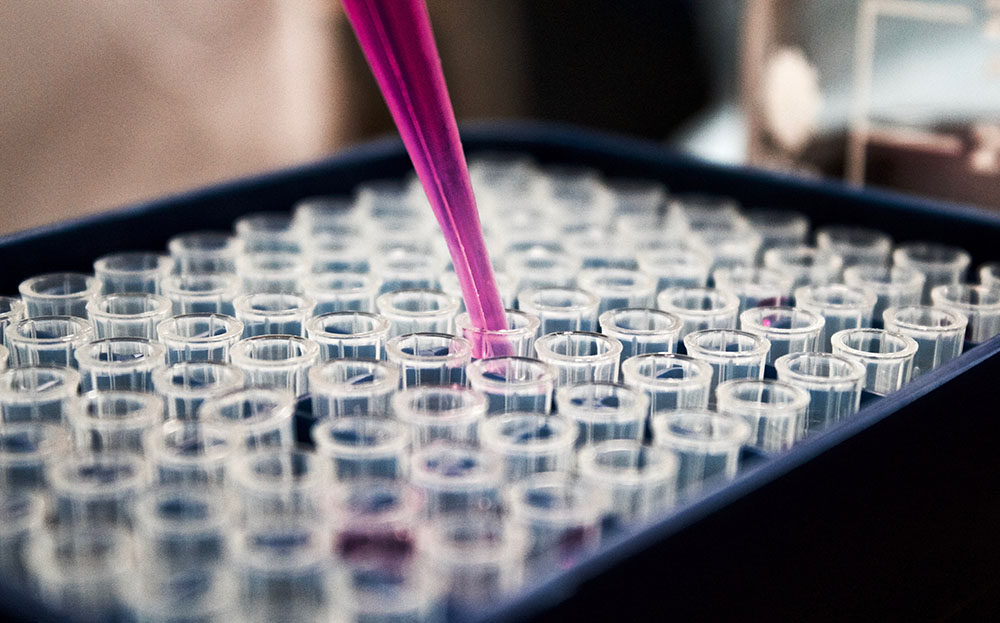
Earlier this month, the newly established COM-Dell Postdoctoral Fellowship Program announced two inaugural research awards. Each recipient team is an interdisciplinary collaboration of experienced researchers in different fields mentoring postdoctoral and current medical students.
“The goal of the new program promotes collaborative research among diverse areas in the college,” explains John Goudreau, D.O., Ph.D., FACN, associate dean of research at the college. “When you put people together, that’s where exciting new discoveries happen.”
Goudreau continues, “This endowment from Phyllis and Walter Dell allows us to invest in an individual (postdoctoral physician) who brings labs together that might have never worked together otherwise. They’re training a postdoctoral trainee across disciplines and fostering the career of a new investigator who can contribute to the field.”
“By bringing different areas of expertise together, each Principal Investigator has the capacity to explore things they couldn’t do alone,” adds Dean Andrea Amalfitano, D.O., Ph.D. “They can accomplish more together. And these linkages help groups to be more successful in team-based grants elsewhere as well.”
The Dell Postdoctoral Fellowship program is the latest initiative in the college’s push to increase its research infrastructure and resources to support physician-scientists and advance bench-to-bedside research to continually answer the “so what?” question of how lab research benefits patients.
Awardee: Smith / Watts / Story – Hypertension Nanotherapy Treatment
Bryan Smith, Ph.D., Stephanie Watts, Ph.D., and postdoctoral candidate Darren Story, Ph.D., are combining forces to explore new hypertension, or high blood pressure, treatments by studying the impact of using precision nanotherapy (Smith’s lab expertise) to reverse inflammation in perivascular adipose tissue (PVAT) cells, thereby better regulating blood vessels and ultimately lowering hypertension (Watts’ lab expertise). The project developed single-walled carbon nanotubes (SWNT), a novel nanoparticle, to deliver immune modifying therapies that macrophages take up with unprecedented selectivity, and utilized real-time imaging to monitor cell behavior. This innovative technique directly supports the college’s research priority of drug discovery, and treating hypertension is one of the easiest risk factors to address to improve the quality of life in obese individuals.
Awardee: Pestka / Olive / White – Genetics and Toxicology
James Pestka, Ph.D., Andrew Olive, Ph.D., and postdoctoral candidate Dylan White, Ph.D., are joining together to investigate how genetics and environmental factors contribute to tuberculosis (TB) infectivity and outcomes. Specifically, the project will examine how genetic diversity modulates the inflammatory response to silica exposure, a leading risk factor of TB.
“You have two people from completely different areas –– genetics (Olive) and environmental toxicology (Pestka) –– bringing their strengths in a new combination. This is exactly what we hoped would happen with this fellowship,” says Goudreau. “It’s a clever way of looking at genetic traits to determine susceptibility to infection.”
Future Awards
“This year we had two superbly strong proposals and candidates,” praises Goudreau. “We want to fund more projects in the future.”
Applications for the Dell Fellowship will open again in Spring 2022. For more information, contact the Office for Research.
Earlier this month, the newly established COM-Dell Postdoctoral Fellowship Program announced two inaugural research awards. Each recipient team is an interdisciplinary collaboration of experienced researchers in different fields mentoring postdoctoral and current medical students.
“The goal of the new program promotes collaborative research among diverse areas in the college,” explains John Goudreau, D.O., Ph.D., FACN, associate dean of research at the college. “When you put people together, that’s where exciting new discoveries happen.”
Goudreau continues, “This endowment from Phyllis and Walter Dell allows us to invest in an individual (postdoctoral physician) who brings labs together that might have never worked together otherwise. They’re training a postdoctoral trainee across disciplines and fostering the career of a new investigator who can contribute to the field.”
“By bringing different areas of expertise together, each Principal Investigator has the capacity to explore things they couldn’t do alone,” adds Dean Andrea Amalfitano, D.O., Ph.D. “They can accomplish more together. And these linkages help groups to be more successful in team-based grants elsewhere as well.”
The Dell Postdoctoral Fellowship program is the latest initiative in the college’s push to increase its research infrastructure and resources to support physician-scientists and advance bench-to-bedside research to continually answer the “so what?” question of how lab research benefits patients.
Awardee: Smith / Watts / Story – Hypertension Nanotherapy Treatment
Bryan Smith, Ph.D., Stephanie Watts, Ph.D., and postdoctoral candidate Darren Story, Ph.D., are combining forces to explore new hypertension, or high blood pressure, treatments by studying the impact of using precision nanotherapy (Smith’s lab expertise) to reverse inflammation in perivascular adipose tissue (PVAT) cells, thereby better regulating blood vessels and ultimately lowering hypertension (Watts’ lab expertise). The project developed single-walled carbon nanotubes (SWNT), a novel nanoparticle, to deliver immune modifying therapies that macrophages take up with unprecedented selectivity, and utilized real-time imaging to monitor cell behavior. This innovative technique directly supports the college’s research priority of drug discovery, and treating hypertension is one of the easiest risk factors to address to improve the quality of life in obese individuals.
Awardee: Pestka / Olive / White – Genetics and Toxicology
James Pestka, Ph.D., Andrew Olive, Ph.D., and postdoctoral candidate Dylan White, Ph.D., are joining together to investigate how genetics and environmental factors contribute to tuberculosis (TB) infectivity and outcomes. Specifically, the project will examine how genetic diversity modulates the inflammatory response to silica exposure, a leading risk factor of TB.
“You have two people from completely different areas –– genetics (Olive) and environmental toxicology (Pestka) –– bringing their strengths in a new combination. This is exactly what we hoped would happen with this fellowship,” says Goudreau. “It’s a clever way of looking at genetic traits to determine susceptibility to infection.”
Future Awards
“This year we had two superbly strong proposals and candidates,” praises Goudreau. “We want to fund more projects in the future.”
Applications for the Dell Fellowship will open again in Spring 2022. For more information, contact the Office for Research.
